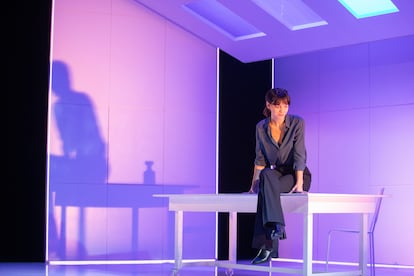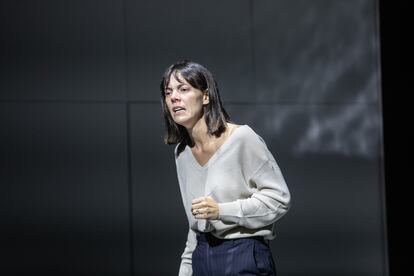The theater puts sexual consent on trial
Actress Vicky Luengo plays a lawyer who goes from defending rapists to suffering an assault herself in a one-woman play that has left its mark in London and New York

Last spring, when actress Vicky Luengo received the offer to star in Prima Facie, she was not looking to do more theater. She was coming off several shoots and in the previous season she had given her all in El Golem [The Golem], Juan Mayorga’s challenging play, which was directed by Alfredo Sanzol and staged at the National Drama Centre in Madrid. But she agreed to read the text; before she’d finished, she knew she wanted to do it. It is a one-woman play by Australian Suzie Miller, featuring an ambitious lawyer who often defends clients accused of sexual assault and believes in “legal truth” above all else…until she herself is raped, and her legal certainties about consent are shattered. Amid the debate over Spain’s “Only Yes Means Yes” law and increasing far-right attacks on feminism, Luengo felt deeply challenged and threw herself into the production, directed by Juan Carlos Fisher.
The actress did not know then that the play was going to premiere at a time when the same debate was once again at the center of the political and social conversation after the president of the Spanish Football Federation, Luis Rubiales, non-consensually kissed soccer player Jenni Hermoso in front of the entire world. Sometimes, the theater serves as the most appropriate way to hold up a magnifying mirror to society. That happened to Luengo when she stumbled upon Prima Facie. “It moved me. It connected me with the anger I feel about the lack of protection women have in the face of sexual assault. Because as much as a news story about a case like the one in the play can shock you, it doesn’t compare to experiencing it through theater. When you see someone in the present going through it in lurid detail, your body records it in a different way and will consider that in the future. Even if only two people at each performance leave with that feeling, it will have been worthwhile for me to get involved in this project,” she said in a conversation with EL PAÍS after a rehearsal in Madrid.
Prima Facie was staged as a single performance at the Teatro Palacio Valdés in Avilés, Spain, on August 18. From August 31 to September 17, it will run at the Teatros del Canal in Madrid and then tour Spain. Barely four years have gone by since the play premiered for the first time in Australia, and it has been performed in several other countries since. A film adaptation has also been announced. Word of its success quickly reached London’s West End, and in 2022, after the pandemic, a new production starring Jodie Comer was presented and won two Olivier Awards: Best New Play and Best Actress. The same show was performed in New York this year, and Comer took home a Tony as well. With that track record, Luengo is likely to win a few awards in Spain, too. It’s another leap in the unstoppable career of the 33-year-old Spanish actress. She has appeared in the series Riot Police and films such as Girlfriends and Cork but has also continued doing theater.

At a time when both feminism and its detractors have come roaring back in Spain, how does Luengo think Prima Facie will be received? “It stands to reason that there will be everything. The reactions I have had in the few performances and rehearsals I have done with an audience have generally been very positive, but there have been some people — women among them — who left saying that, in the play, it was not really clear that it had been a rape, that there’s no explicit ‘no’ from the main character. That is precisely why I am doing this show. Because I want people to see with their own eyes the harm that rape does to a woman’s body. Beyond being able to express it in words, the ‘no’ is evident,” the actress says.
In order to portray that harm, Luengo makes the character’s huge transformation work on stage. In the first part we see an arrogant, controlling and self-confident lawyer. In the second part, she looks like a different person. Her body changes. She is full of doubt and comes to question her memories when she takes the case to court. “That’s what I want to be seen. Even though there are laws condemning rape, when you go to court it’s not easy to prove. You’re branded a liar. The yes-is-yes law is progress, but society also has to change so that it can be applied effectively. The law will not work as long as there are men and women who do not realize when an aggression is being committed because certain behaviors are normalized,” the actress emphasizes.
As her character says in Prima Facie, “There was a time, not so long ago, when courts like this one didn’t ‘see’ that non-consensual sex in marriage was rape, didn’t ‘see’ that battered women defend themselves differently from men. However, once we ‘see,’ we can no longer ‘unsee,’ can we?” The feminist wave unleashed in Spain by Rubiales’ non-consensual kiss attests to that. Nevertheless, Luengo warns: “It is true that the concept of consent that my grandmother may have is already very different from mine. But we must not lose sight of Simone de Beauvoir’s phrase: ‘Never forget that a political, economic or religious crisis will be enough for women’s rights to be questioned again.’ We must remain vigilant. I can’t go three days without receiving an unpleasant comment in the street. I used to keep walking, but not now. I stop and respond.”
Does the actress think that a play can help change the world? Luengo sighs: “This works audience member by audience member. It’s a matter of education, and a change in mentality doesn’t happen overnight, but the experience of theater can contribute to that change. Because culture generates discourse. And discourse creates reality.” Here’s proof: the poster advertising Prima Facie performances in New York was made up of a thousand women’s faces arranged to draw Jodie Comer’s face; the small portraits were photographs of real victims of sexual assault who had seen the show the previous year in London and had identified with it to such an extent that they sent letters to the producers to share their own experiences.
Sign up for our weekly newsletter to get more English-language news coverage from EL PAÍS USA Edition
Tu suscripción se está usando en otro dispositivo
¿Quieres añadir otro usuario a tu suscripción?
Si continúas leyendo en este dispositivo, no se podrá leer en el otro.
FlechaTu suscripción se está usando en otro dispositivo y solo puedes acceder a EL PAÍS desde un dispositivo a la vez.
Si quieres compartir tu cuenta, cambia tu suscripción a la modalidad Premium, así podrás añadir otro usuario. Cada uno accederá con su propia cuenta de email, lo que os permitirá personalizar vuestra experiencia en EL PAÍS.
¿Tienes una suscripción de empresa? Accede aquí para contratar más cuentas.
En el caso de no saber quién está usando tu cuenta, te recomendamos cambiar tu contraseña aquí.
Si decides continuar compartiendo tu cuenta, este mensaje se mostrará en tu dispositivo y en el de la otra persona que está usando tu cuenta de forma indefinida, afectando a tu experiencia de lectura. Puedes consultar aquí los términos y condiciones de la suscripción digital.









































